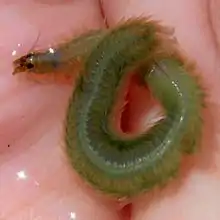巧言虫
绿巧言虫(學名:)是葉鬚蟲目葉鬚蟲科巧言蟲屬之下的一個多毛纲物種[4],有着亮綠色的外表。本物種長約5至15 cm(2至6英寸)。在北大西洋海域,見於歐洲的挪威、英國及愛爾蘭[1]的淺海或貽貝床[5][6]。
| 绿巧言虫 | |
|---|---|
 | |
| 顏色亮綠的绿巧言虫 | |
| 科学分类 | |
| 界: | 动物界 Animalia |
| 门: | 環節動物門 Annelida |
| 纲: | 多毛綱 Polychaeta |
| 目: | 葉鬚蟲目 Phyllodocida |
| 科: | 葉鬚蟲科 Phyllodocidae |
| 属: | 巧言虫属 Eulalia |
| 种: | 绿巧言虫 E. viridis |
| 二名法 | |
| Eulalia viridis | |
| 異名[2] | |
| |
其种加词“viridis”意为“绿色的”。
形態描述
巧言蟲是一種背部扁平又纖細的蠕蟲,有體節高達200節。蠕蟲最長可以生長至15 cm(6英寸),顏色從中綠色到亮綠色。頭部有五條觸角、兩隻眼及四對tentacular cirri;the eversible proboscis is cylindrical and dotted with rounded papillae. Each body segment has a pair of parapodia, and the cirri on these are long, thin and pointed. They project outwards, forming a fringe down each side of the body.[7]
分佈及棲息地
1990年代以前,巧言蟲被認為遍佈東北大西洋,包括環繞英國的水域[1],但形態學及生物化學研究表明在分佈於南部的物種應屬另一物種,即Eulalia clavigera;而這兩個物種形成了一個生物複合種[8]。
As now recognised, E. viridis is native to the northeastern Atlantic Ocean where it is found in the waters off Norway, Sweden, Denmark and Germany, as well as the 法罗群岛, Iceland and 迪斯科岛 at depths from the mid-shore down to about 150米(500英尺). It is typically found on rocky coasts and on shelly gravel,[9] in rock crevices and 無孔貽貝 beds.[7]
主要分佈於在中國分佈於山東半島、遼東半島[10][11]、黄海、东海、南中國海[1],還有白海、新西伯利亞群岛、白令海、千岛群岛、勘察加半岛、鄂霍次克海、日本海等海域[1]。 一般栖息于北方和亚热带水域以及主要栖息于潮间带和潮下带海藻、藤壶、牡蛎及海鞘等附着动物和岩石下[1][5][6]。其生存的海拔下限为-2400米[1]。
生物學
Although many worms in this family are 捕食 and actively hunt prey, E. viridis seems to be more selective in its diet, and researchers found that it only consumed moribund or dead animal tissue. Breeding does not take place until the worms are at least two years old, and they are not thought to form swarms as do some other related species.[12] The greenish gelatinous egg mass is attached to 褐藻纲, but some populations seem not to have egg masses. The larvae pass through one or two 担轮幼虫 stages and two other stages before settling on the sea bed as a five- to nine-segmented larva, after up to nine weeks.[12]
参考文献
- 中国科学院动物研究所. . 《中国动物物种编目数据库》. 中国科学院微生物研究所. [2009-04-16]. (原始内容存档于2016-03-05) (中文(简体)).
- Read G, Fauchald K, Bellan G. Read G, Fauchald K , 编. . World Polychaeta database. [2021-11-30] –WoRMS.
- Linnaeus. 1 12th. Holmiae: Laurentii Salvii. 1767: 1086 [2021-12-09]. (原始内容存档于2021-12-09).
|issue=被忽略 (帮助) - . . Reading, UK: Species 2000. 2019 [2020-05-21] (英语).
- Brusca, R.C.; Brusca, G.J. . Sunderland, Massachusetts: Sinauer Associates. 2003 (英语).
- Hayward, P.J.; Ryland, J.S. . New York: Oxford University Press. 1995 (英语).
- Pizzolla, P.F. . MarLIN. Plymouth: Marine Biological Associat的ion. 2008 [23 July 2017]. (原始内容存档于2022-01-19).
- Fish, J.D.; Fish, S. . Cambridge University Press. 2011: 167. ISBN 978-1-139-49451-9 (英语).
- de Kluijver, M.J. . Macrobenthos of the North Sea – Polychaeta. Marine Species Identification Portal. [23 July 2017]. (原始内容存档于2021-12-09).
- . [2021-12-19]. (原始内容存档于2021-12-09) (中文(简体)).
- 陈义等. . 北京: 科学出版社. 1959: 1–78 (中文(简体)).
- Australian Biological Resources Study. . Csiro Publishing. 2000: 145–147 [2021-12-09]. ISBN 978-0-643-06571-0. (原始内容存档于2021-12-06).